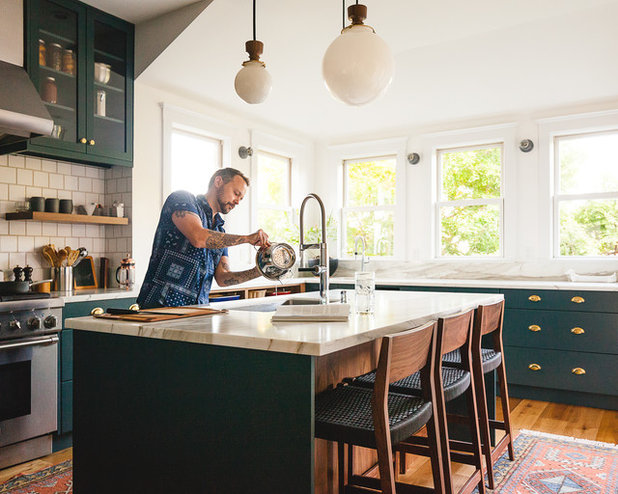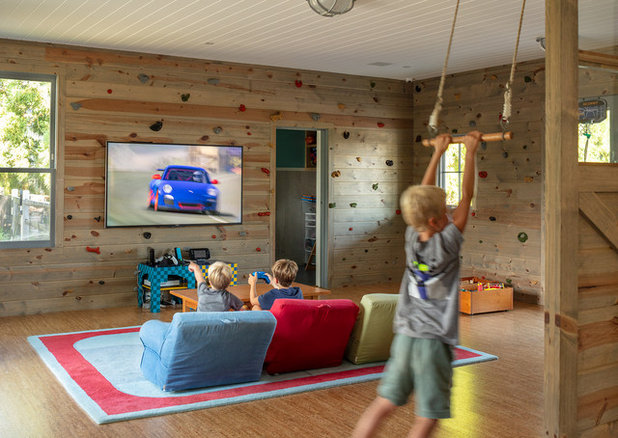1. Do You Have Enough Space?
How much space is enough to share is ultimately up to you and your family; the important thing is to be honest about your needs from the beginning. You may discover that your parent is the one who wants to have more space than you currently have available to share — or that you both feel that way. In this case, you could look into building an in-law cottage, adding on or (if those aren’t feasible options) helping prepare your parent to age in place instead.

2. Are You Equipped to Handle Health Concerns?
There’s a world of difference between moving in an aging parent who is healthy and active (they may even be able to help care for grandkids!) and sharing your home with a parent with dementia or other serious health issues. If you’re unsure which, if any, health issues your parents are facing, it’s important to have a conversation about it before you decide to live together.
If there are health issues you need to be informed about, arrange to have a consultation with your parent’s physician. Do research in advance to be sure your home and family members are prepared — and be aware that circumstances can change down the road, meaning that even a healthy parent or condition now under control could require different care later.

3. Can You Make Your Home Accessible?
If you have room (or can make room) for your parents and feel well equipped to provide for their health needs, the next step is to be sure your space is safe and accessible. For example, if your home has more than one story, is there enough space on the ground level for your parents’ bedroom? You may need to make adjustments (like updating the bathroom to include safety features or installing a ramp or elevator), so it’s important to start planning early. And remember, even if your parents are healthy and active now, they may lose some mobility later on, so it could be easier if your space is ready from the start.

4. How Do Your Loved Ones Get Along?
As anyone who’s cohabited with a loved one knows, living in close proximity can put a strain on even the healthiest relationships. If you or your partner have a complicated or contentious relationship with your parents (or in-laws, if that’s who’s moving in), it’s important to honestly assess whether living together is a good idea. Even if your family relationships are good, it’s smart to be proactive — this might mean getting counseling together before the big move, putting a strategy in place for how you’ll handle conflicts, or setting a schedule for regular family meetings.

5. What Are Your Expectations Around Chores?
Seemingly small daily routines — grocery shopping, cooking dinner, cleaning up — can become trying if you wind up feeling like you’re doing more than your fair share. Instead of letting annoyance sneak up on you, think through a plan for handling chores and other regular tasks in advance. If you know that your parent won’t be able to help with the cooking, shopping or cleaning, consider setting aside a small amount in the budget each month for extra help when you really need it. If paying a little extra for that grocery delivery or cleaning service can help you avoid feeling resentful, that’s money well spent.

6. How Will You Handle Privacy?
Going from living on your own to sharing space with your parents again can be something of a shock, especially when it comes to the sudden loss of your personal space and privacy — a sentiment your parents may share. Try to strategize about this issue beforehand, so your home and schedule are set up in a way that builds in a sense of privacy and independence for everyone involved.
Ways to boost privacy:
- Build an in-law cottage in the backyard.
- Add a studio with separate entrance.
- Divide space with sliding doors.
- Bump out your bedroom to create a master retreat.
- Plan together time and solo time — and put it on the calendar.

Michael McKinley and Associates, LLC
7. How Can You Help Kids Handle the Change?
Grandparents and grandkids living under the same roof can develop incredibly close bonds, but there are bound to be a few bumps along the way. If your parents are in good health and want to be involved in caring for their grandchildren some of the time, be sure you’re all on the same page about what to expect. If your parent has dementia or another serious health challenge, you’ll need to prepare your kids for what day-to-day life will be like with Grandma or Grandpa in the house.
To help smooth the transition to sharing their home, it can help to carve out a kid-friendly zone — or a hangout area for teens — where the youngest generation can get a little space away from the grown-ups. Let your parents know this kid zone is a spot where some extra noise and mess are acceptable.

8. Will You Need Space to Work at Home?
If you work from home full or part time, you know that having a clearly marked space where you can concentrate without interruption is essential. What may not be quite as clear is the impact your cohabiting parents will have on your work life. Have a conversation with your folks early on about privacy, interruptions and noise during your working hours, then decide whether you need to make any changes to your current setup.
Ways to protect your at-home work time:
- Make your office part of your master bedroom; lock the door when you’re working.
- Add a studio shed to the backyard.
- Transform an out-of-the-way space — like the attic, basement or garage — into your workspace.
- Look into local coworking spaces for days when you just need to get away.

9. What About Pets?
Do you or your parents have pets? If so, you’ll need to consider how the animals will get along, as well as what to do if anyone in the household has pet allergies. You may want to consider having a “test run” before committing — this can be helpful in gauging pet compatibility as well as making sure no one is allergic. It’s also worth looking into ways of reducing pet hair and messes around the house, whether or not allergies are involved.

10. What Outside Help Can You Access?
Caring for your aging parents on your own can get complicated when you want to go on a vacation, need to travel for work, or if their health declines and they need more assistance than you may be able to give. If and when the time comes that you need some extra support, it will be a whole lot less stressful if you’ve already done some of the legwork and know who to call.
Here are a few questions to ask to get the ball rolling:
- Are there siblings or other relatives nearby who would be willing to lend a hand if needed?
- Are your parents already connected with any groups or resources in the community that could be of assistance?
- Can you connect with a local respite caregiver or adult day care program?

Recent Comments